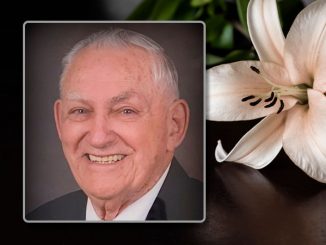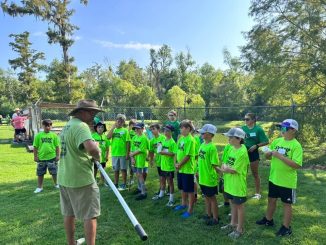
Joe Durr was in a dark depression struggling with his experience from the Vietnam War and, particularly with the memories of the people he killed that had him living like a hermit.
“I was moping with nothing to do,” Durr said of having just retired from Union Carbide. “I have PTSD from the war, but going to the post there is a comradeship and it’s all absolutely great. We all have something in common.”They all experienced war.
Durr was invited to the West St. Charles Post 3750 in Luling nearly seven years ago and, with his wife’s encouragement, he started going there. He unhesitatingly praised the post, the people and opportunity to be with people who understood him as a life changer.
Now, as the post’s junior vice commander, he’s one of the people celebrating the post’s 50th anniversary on May 21.Post Commander Bobby Lovergne said a celebration is planned to honor that day.
For Durr, the post resonates deeply.
“It gave me my heart back,” he said.
Until then, he didn’t talk about his wartime experiences or the problems he had with PTSD that cost him two marriages.
“I was proud to be a Marine,” he said. “It was scary, but you kind of got used to it after a while. Years later, it bothers me more now than it did then and that’s where the post comes in helpful.”
Like most vets, Durr, who was a radio operator with the U.S. Marines from 1967-68, has his own war stories.
“I got shot down in a Chinook helicopter and we were in the jungle basically trapped,” he said. “F1 jets were dropping bombs all around us to protect us – two squads. After eight to nine days, a whole battalion marched in and wanted to get us out and rescue the helicopter. They lifted that chopper and we walked for miles back to the post.”
The most afraid that Durr could recall ever being in the war came one night standing by a river and then hearing Vietnamese spoken nearby.
“We just listened and one of them was playing with a rifle, but it was dark … you couldn’t see anything,” he recalled. “The Vietnamese was yelling, ‘Come here’ and you hear the boats coming to get him. Then the squad leader threw a grenade. After you pull the pin, the spook flies off and it said, “Pling,” and I put my head in the sand. We got up and just started shooting.”
Durr formed lifelong relationships in these encounters, and a need to connect with others who served in war.
He considers the post a “lifeline.”
Not only is the post aiding vets of the nation’s wars, but also those that followed them such as those serving in Afghanistan, Durr said. The older vets are working with the younger ones to survive their traumas.
“I’m still kicking,” Durr said. He tells them to be proud of their service and “try not to let it upset you. Believe me, there is a lot of stuff that upsets you. Really, I lost my Christianity at that time. I made a deal with God, ‘If you get me through this, I wouldn’t ask for nothing.’”Durr kept that deal, but it hasn’t been easy.
The Vietnam vet copes with PTSD and Agent Orange poisoning, although he’s getting help for it, and the post provides the support he relies on to get through these health issues.Lovergne agreed with Durr about the importance of comradeship for the vets.
“When you’re in the military you have strong comradeship, but on the job you don’t have that,” he said. “The post gives you that again. We all have that in common. We defended that flag. You have that sense of belonging again.”Lovergne, who has served as commander for seven years, served in Desert Storm, November 1990 to June 1991, and he retired from the U.S. Air Force after 20 years of service.
Last year, the 156-member post was awarded All-American Post for the first time, a national honor given for completing all membership requirements, all community service projects and honoring community leaders. Lovergne said the post finished in the top 30 in Division 5, which consists of 418 posts in the nation.
Established in 1971, the veterans met at a church in the early years while the post was being built at 140 Angus Road, he said.
“We’ve seen a lot of change in the post in the last 10 years,” he said. “The whole hall has been done. It’s a different dynamic from back when I joined. The members are getting older so we need younger combat vets who can continue the traditions of the Veterans of Foreign Wars.”
Also, the auxiliary, which once accepted only women, now accepts both men and women.
“That is a big change made over the last three years, which allows a female vet’s husband or son or father to join the auxiliary,” he said. “Our membership has gone up. You get more involvement because now you can include the whole family.”
The group has its first male president, Mike Kinler, in the state of Louisiana, Lovergne said. This group will celebrate its 50th anniversary next year.
“That’s kind of a focal point for the parish,” Lovergne said of the post. “Everyone knows where the post is near St. Charles Parish Hospital.”




Be the first to comment